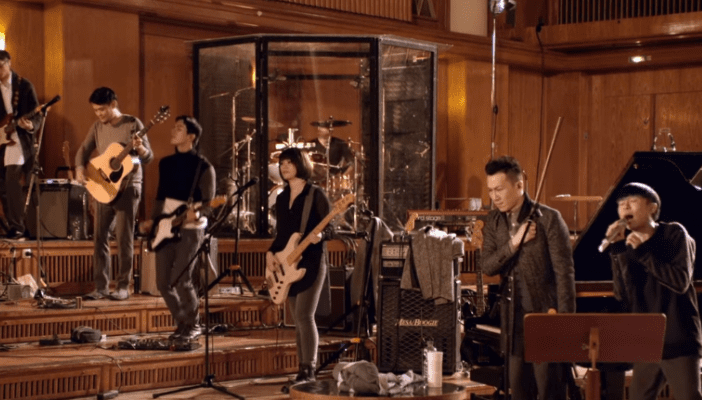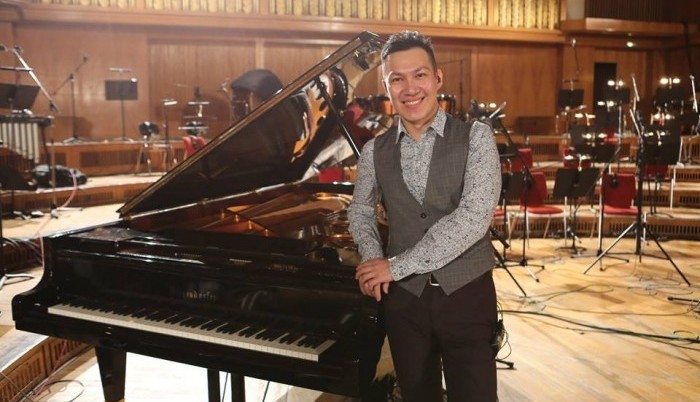<Zinnia Flower>-The classical music that is crucial
Q6: In the scene where Ko Jia-yan acts as the wife of Yun-Wei, Xiao-Wen, her friends come to the house to visit and the little kids spontaneously start playing piano. Was this arranged by you as well?
This was what the director already had within the film, honestly when I watched it I myself really liked this part, and had a similar experience previously. From when I was little I was like Xiao-Wen, in my house I had a piano, so would also have that kind of contact book, didn’t think that this experience would be put in the director’s works.
Q7: It feels like the director really let go and allowed A-Gong take over on the film’s music.
Yes, of course I did a lot of the parts, and then at the end picked out one sentence, but many film music situations tend to be this way. When I first got to know the director, actually I did previously create a version of the music that just used the piano, and then afterwards I myself felt that this type of music was too ‘much’, the expression of emotions was not prominent enough. So after that I did some ‘strange’ music for the director, and after that began to have more resonance in musical ideas with the director, finding the kind of feeling that we both wanted in the music, but this strange music was not used in the end.
Q8: A little big curious about how this music was ‘strange’…
It was more like ‘without a key’. Because I added the cello, and used an electric violin with a synthesizer and then added piano. I felt that this music showed a lot of the male lead Yu-Wei’s emotions, in the entire movie he had these internal struggles, very much like a kind of psychological conflict.
Q9: So the entire film’s music was organized by you?
Actually even the Chopin parts were played by me, this time around arranging reaped a lot of benefits for me, by allowing me to practice my piano once again. The Chopin etudes in the movie, Beethoven and Mozart’s symphonies were all re-recorded and played by me, I also played a little violin, but the most used instrument was the cello because I really wanted to make it prominent. I feel that the cello is very central to the music of this film.
Because the cello’s sound is not resonant enough and not deep enough, a majority will use it as an accomplanying instrument, but this time I used it as our lead instrument. I feel that the cello’s sound is more middle, like the range of sounds people can make, so I really like using the cello to express emotions in the most abundant parts.
Q10: So can you simply discuss the self-composed works in the movie?
There are several of my self-composed works in there, like when Xin Min opens the last card. I remember that composition deeply, it was recorded at about 2am in the morning.
“Ok, today I’m going to play this piece.” Because this part was a very important part of the film, and was where the emotions were completely released. Actually I played it correctly on the first go, first using the piano to play it, and then afterwards adding other things in. But in the midst of playing, I also added Chopin Etude-style arrangement into it, because it had a bit of a faster six-tone beat.
So this time when I was writing, the motivation to use classical music appeared organically, somewhat interlinked, the complex parts were reflected by the classical music, and the ones I wrote were more simple, with more stable melodies and shape, without too many ups and downs, more stacked, from nothing to something, from less to more.
▼The trailer of "Minnia Flower"
Q11: In the movie there were many references to classical music, does this have to do with Xian Wen’s role as a piano teacher?
Yes, actually the part with classical piano was already set by the director. I used more of a bystander perspective to look at the director’s music. Because the director is very hardworking, he said he listened to Chopin’s Etude from start to finish and felt that his Opus 25 No.1 work was the most suitable, afterwards I too had the same idea as the director, flipping through all the etudes and playing them roughly.
Speaking from a normal perspective, say “Zinnia Flower” –this theme , the first thing we think about is a farewell etude, but we don’t think of Chopin’s Etude Opus 25 no.1. But the farewell etude’s melody is too broad for people to understand and I felt that the farewell etude’s melody represents farewell, a very obvious positioning, but does not suit this movie because the farewell etude’s style is more depressed, Chopin’s etude opus 25 no.1 instead has a very passionate comparison with the male lead’s feelings, so I can understand why the director chose this etude.
Q12: So playing Chopin’s etudes again, what new feelings do you have?
Initially we all take these as practice pieces, so actually my heart did not have any imagery. But after using it to accompany the first car crash scene and the feelings of the male lead, I instead have a conflicting view, taking this etude as a work to be performed. I realized that although the Etudes sound pleasurable, inside is hidden many parts which do not actually make people feel happy, and in the middle especially there are many changes in the chords, some of which do not sound as happy as the first part.
At the beginning when we were organizing all these things we just wanted to simply memorize the music without any ideas or imagery, I feel this time coordinating the entire film’s plot instead let me have an even better understanding of this Etude’s twists and turns. Because we don’t think about how feelings can change, and it is hard to encompass the ups and downs within the Etude. So to me this performance and the others that have come before it were different in that there were many more connected images.
Q13: It seems that after listening to Chopin’s Etudes and the ups and downs of “Zinnia Flower”, they call upon each other and rely on each other.
Yes, you could say that this part of music is Yu Wei’s most fervent memories of Xiao Wen, perhaps when he thinks of Xiao Wen this music will appear.
Q14: The ending arrangement seems to be left mostly to audiences for them to release their own emotions.
The music at the end is quite long, and tries doing a lot of different scenes. To me a section of music cannot let the melody repeat too many times, it must have ups and downs and changes, after listening to this version I am quite satisfied, as it depicts many things.
Of course listening intuition is more abstract, the director also wanted the audiences to slowly understand, and then gain a bit of expression So at the last part we first did some elaboration and then at the peaking points ended it.




